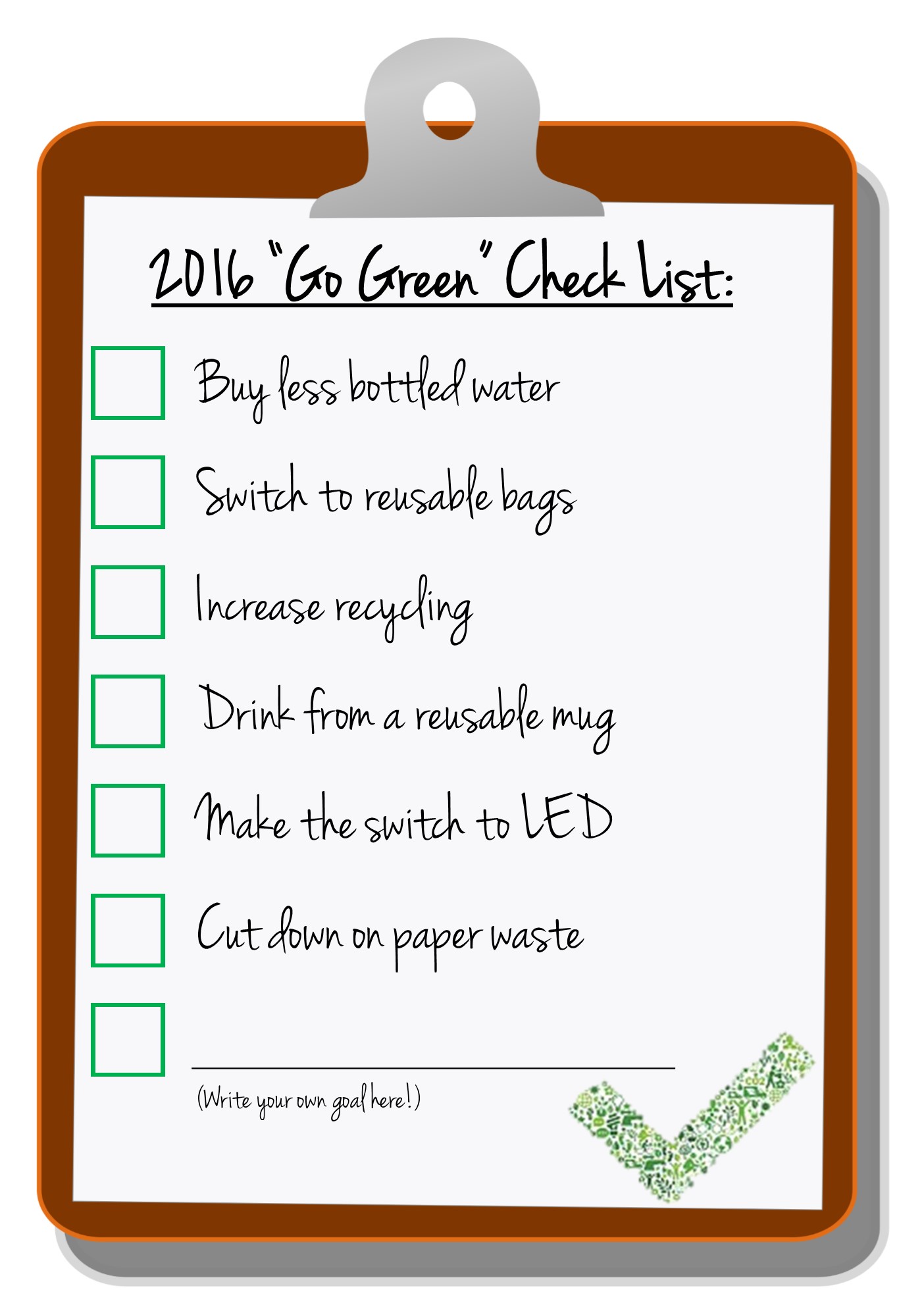Regardless of the personal changes you decide to make in your life, the New Year is a great time to learn more about environmental issues and why they are important. Below are a few of our ideas for EASY green resolutions for 2016 that you can use at LaRC and at home, and we’d love for you to add your own green New Year’s goal as well!
After learning a little about your new goals, print the checklist below to help track your progress in 2016!
1. BUY LESS BOTTLED WATER
- “Imagine a water bottle filled a quarter of the way up with oil. That’s about how much oil was needed to produce the bottle.” –National Geographic
- According to the EPA, over 25% of bottled water comes from the same place as tap water (a municipal water supply).
- Drinking 8 glasses of water per day will cost you about 50 cents per year from the tap, but up to $1,400 from a bottle.
- The solution is simple: buy a reusable hard bottle and drink from the tap. If you don’t want to drink your water from a faucet, invest in a filter.
- A BPA-free plastic bottle (like a Nalgene) or a stainless steel type are affordable options that will last for years.
2. SWITCH TO REUSABLE SHOPPING BAGS
- The petroleum used to make 14 plastic bags could drive a car for a mile (sprep.org) –that is a lot of wasted energy and pollution!
- The average American family takes home almost 1,500 shopping bags a year (NRDC)
- For 2016, break the habit and make a serious effort to use only reusable shopping bags. Many shops are starting to charge a few cents for the bag anyway, so this could save you money in the long run.
- Reusable totes are sold in most grocery stores
3. INCREASE YOUR RECYCLING
- Aluminum can be recycled indefinitely, and energy costs drop 2-3% when making glass from even 10% recycled material.
- In FY15, LaRC recycled 4,470 pounds of aluminum cans and 6,250 pounds of plastic bottles. Keep up the great work! Recycling activities on the Center result in returned income for LaRC to use on sustainability initiatives.
- Locate the recycle bins in your office. If they’re out of your way, set up a box in your office for cans and bottles that you can empty in the bin down the hall when it gets full. You can also place a reminder by the trash can so you don’t accidently throw recyclables away.
4. DRINK FROM A REUSABLE MUG
- According to Clean Air Council, American office workers use about 500 disposable cups per person every year. If everyone invested in a good-quality reusable mug, this number could be reduced significantly.
- For 2016, buy yourself a nice mug and keep it at your office. Enjoy sipping your cup of Joe from an eco-friendly source!
5. MAKE THE SWITCH TO LED
- A lot can change in 25 years…. But your LED light bulbs won’t have to! LED bulbs last up to 25 years, while incandescent bulbs last just one. This will save you money in replacement costs.
- LED lights emit less heat than incandescent and halogen bulbs, cost less to run, and consume less energy. All of these things benefit the environment and keep more cash in your pocket.
- Don’t like the look of LEDs and think they’re too bright? Many people don’t realize that you don’t have to purchase the bright white lights! LEDs bulbs are also available in “warm white”.
- Make the switch now! Many stores now offer LED light bulbs in bulk, making it easy to replace all of your old, inefficient light bulbs.
6. CUT DOWN ON PAPER WASTE
- According to the Clean Air Council, a ton of paper made from recycled paper saves up to 17 trees and uses only half the water of paper from virgin pulp.
- The energy equivalent of 185 gallons of gasoline is saved from every ton of paper recycled. (Clean Air Council)
- Switch to paperless options for monthly billing statements.
- Only print when necessary. Print double-sided whenever you can.
- Opt out of junk mail! http://www.consumer.ftc.gov/articles/0262-stopping-unsolicited-mail-phone-calls-and-email



I am curious about plastic garbage bags- for kitchen trash.
We have been encouraged to use fabric bags for purchases to avoid one-use bags, and save petroleum used to manufacture those bags. But we must enclose our garbage in plastic bags when they go out into the bins for pickup.
Which is worse? To create more plastic bags specifically for one-use (taking the trash out of our house) or to use the bags carrying my purchases to take the trash out and avoid purchasing kitchen garbage bags (tall, handles, ties, pull strings, scented, etc..)
Hi Lynne,
That is an excellent question. I passed it around the environmental office and received some interesting answers.
1) The discouraged use of plastic bags at stores is not just to reduce petroleum used but also to cut down on litter. The plastic grocery bags end up in the environment (picture our ditches, strip malls, streams, etc) more than the ones that go to the landfill in our trash.
2) For those who prefer to use plastic grocery bags, their negative effects can be minimized by taking advantage of recycling centers (most grocery stores offer this) or reusing them around the house (pet waste, lunch bags, etc). Some schools sponsor programs that collect plastic bags for recycling to make park benches or other ways to improve the community. It’s the bags that don’t get recycled and end up as litter or directly in the garbage can that have the largest negative impact on the environment. So even your idea of reusing plastic grocery bags for your garbage is better than just throwing the plastic bags away as soon as you unpack your groceries!
3) When comparing whether it’s better to reuse plastic bags vs new garbage bags for your trash… Here’s just one thought. If you look at how many plastic bags you get on a grocery run (at least 10 each time?), you would have to use all of those up before your next grocery run (or recycle the remainder). Plus, factor in any other bags you received (Walmart, Target, the mall, etc). But a kitchen bag holds a lot more than a plastic grocery bag, so you’re only using maybe 1-2 a week. Essentially, you’d be using more than 10 grocery bags to save 1 large garbage bag. So even though it might take more petroleum to produce the larger garbage bag than the smaller grocery bag, you’re probably using less petroleum overall. Plus, there are biodegradable options for garbage bags and the number of garbage bags can be reduced by reducing the waste that the home generates!
And finally, residents of Hampton and Poquoson can also know that all trash leaving their house goes to the Waste to Energy Plant to be used for energy for our Center!